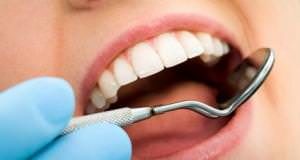One High-Fat Diet, Two Different Outcomes: The Path To Obesity Becomes...
Why is it that two people can consume the same high fat, high-calorie Western diet and one becomes obese and prone to diabetes while the other maintains a slim frame? This question has long baffled scientists, but a study by Yale School of Medicine researchers provides a simple explanation: weight is set before birth in the developing brain.
Diets Bad For The Teeth Are Also Bad For The Body
Dental disease may be a wake-up call that your diet is harming your body. "The five-alarm fire bell of a tooth ache is difficult to ignore," says Dr. Philippe P. Hujoel, professor of dental public health sciences at the University of Washington (UW) School of Dentistry in Seattle. Beyond the immediate distress, dental pain may portend future medical ...
How Cavity-Causing Microbes Invade Heart
Scientists have discovered the tool that bacteria normally found in our mouths use to invade heart tissue, causing a dangerous and sometimes lethal infection of the heart known as endocarditis. The work raises the possibility of creating a screening tool -- perhaps a swab of the cheek, or a spit test -- to gauge a dental patient's vulnerability to the condition.
Message To Postmenopausal Women: ‘Increase Yearly Dental Checkups,’ Researcher Urges
Postmenopausal women have a new health message to hear. Two annual dental checkups aren't enough. Older women need more, according to research findings from the Case Western Reserve University School of Dental Medicine and the Cleveland Clinic.
Gum Inflammation Linked To Alzheimer’s Disease
NYU dental researchers have found the first long-term evidence that periodontal (gum) disease may increase the risk of cognitive dysfunction associated with Alzheimer's disease in healthy individuals as well as in those who already are cognitively impaired.
Study Hints At Why Gums Suffer With Age
New research from Queen Mary, University of London in collaboration with research groups in the USA sheds light on why gum disease can become more common with old age. The study, published in Nature Immunology, reveals that the deterioration in gum health which often occurs with increasing age is associated with a drop in the level of a chemical called Del-1.
Joint Failures Potentially Linked To Oral Bacteria
The culprit behind a failed hip or knee replacements might be found in the mouth. DNA testing of bacteria from the fluid that lubricates hip and knee joints had bacteria with the same DNA as the plaque from patients with gum disease and in need of a joint replacement.
More Than 90 Percent of People With Gum Disease Are at...
An overwhelming majority of people who have periodontal (gum) disease are also at high risk for diabetes and should be screened for diabetes, a New York University nursing-dental research team has found. The researchers also determined that half of those at risk had seen a dentist in the previous year, concluded that dentists should consider...
Molecule Discovered That Makes Obese People Develop Diabetes
Many people who are overweight or obese develop insulin resistance and type 2 diabetes at some stage in their lives. A European research team has now discovered that obese people have large amounts of the molecule CXCL5, produced by certain cells in fatty tissue.
Sex Hormones May Explain Higher Risk Of Gum Disease In Men
Sex hormones may be the biological reason why men are at greater risk than women for destructive periodontitis, an infection of the gums, according to researchers at the University of Maryland Dental School.
Filling Without Drilling: Pain-Free Way of Tackling Dental Decay Reverses Acid...
Researchers at the University of Leeds have discovered a pain-free way of tackling dental decay that reverses the damage of acid attack and re-builds...
Oral Bacteria Enables Breaking Bond On Blood Vessels To Allow Invaders...
A common oral bacteria, Fusobacterium nucleatum, acts like a key to open a door in human blood vessels and leads the way for it and other bacteria like Escherichia coli to invade the body through the blood and make people sick, according to dental researchers at Case Western Reserve University.















